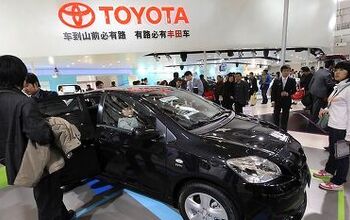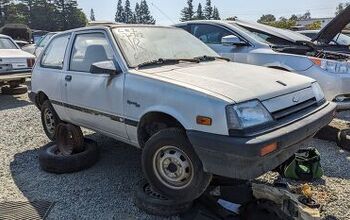Chinese Boycott Of Japanese Cars Hurts Chinese Companies The Most

Sales of Japanese cars in China dropped 40 percent in September as a result of the islands rumpus. The shares of Nissan, Toyota and Honda shares lost about 10 percent of their value. Chinese state-owned enterprises lost much more.
“State-owned Dongfeng Motor Group Co., China’s second-largest automaker by vehicle sales, and sixth-ranked Guangzhou Automobile Group Co. saw their stock prices slide 16 percent since mid-September,” reports The Nikkei [sub]. Why? The Chinese companies are much more dependent on Japanese cars than Japanese carmakers on the Chinese market
As outlined two weeks ago, Dongfeng Motor makes cars in joint ventures with Nissan and Honda. Guangzhou Automobile has joint ventures with Honda and Toyota. Says The Nikkei [sub]: .
“Japanese brands account for 40 percent of Dongfeng’s sales and 90 percent of Guangzhou’s. Some 3.5 million Japanese-brand cars were sold in China last year, giving them a 20 percent market share. Of those, 90 percent were made in China. With a local content ratio of around 90 percent Japanese-brand cars are essentially made in China.”

Bertel Schmitt comes back to journalism after taking a 35 year break in advertising and marketing. He ran and owned advertising agencies in Duesseldorf, Germany, and New York City. Volkswagen A.G. was Bertel's most important corporate account. Schmitt's advertising and marketing career touched many corners of the industry with a special focus on automotive products and services. Since 2004, he lives in Japan and China with his wife <a href="http://www.tomokoandbertel.com"> Tomoko </a>. Bertel Schmitt is a founding board member of the <a href="http://www.offshoresuperseries.com"> Offshore Super Series </a>, an American offshore powerboat racing organization. He is co-owner of the racing team Typhoon.
More by Bertel Schmitt


































Comments
Join the conversation
The WSJ has an excellent article on this subject, how the China-Japan dispute is hurting Chinese workers and businesses: http://online.wsj.com/article/SB10001424052970203400604578074283948389390.html?mod=WSJ_hps_sections_world The impact is much more complicated than looking at earnings. Chinese working for Japanese companies, which is 1.6 million people to 5 million depending on who you ask, are legitimately worried for their jobs. While they are still getting paid, and given paid time off or put in training, they are not getting overtime, and that additional income they expect. And those workers aren't using money in local businesses, they eat out less, they spend less money. Meaning businesses such restaurant are also being effected. Worse, modern production relies on JIT (just-in-time), meaning that these factories use a network of fast-moving, usually local, suppliers. Cutting production by half will have a ripple effect throughout the economy.
Warning: Conspiracy theory ahead Did high ranking Chinese officals short the domestic car compaines and then start to stir the pot with the Japanese? The officials could make a very nice, quick profit from the temporary fall in Chinese car manufacturer stock prices.
Like the old proverb says (which may be of Chinese origin): Be careful on what you wish upon your enemy
perhaps the chinese partner wanting to vait till the japs cannot handle the blood letting then sell the plants at a fire sale price. these kind of large scale investments do need so much cash flow daily inorder to keep the lights on too. when its sputtering or not firing in all cylinders is going to hurt greatly. not sure what is the jap culture nowadays will they adhere to this, usually when a lower rank discovered a higher rank's mistake they still follow thru, kind of blind follow's the blind as our western culture put to it.